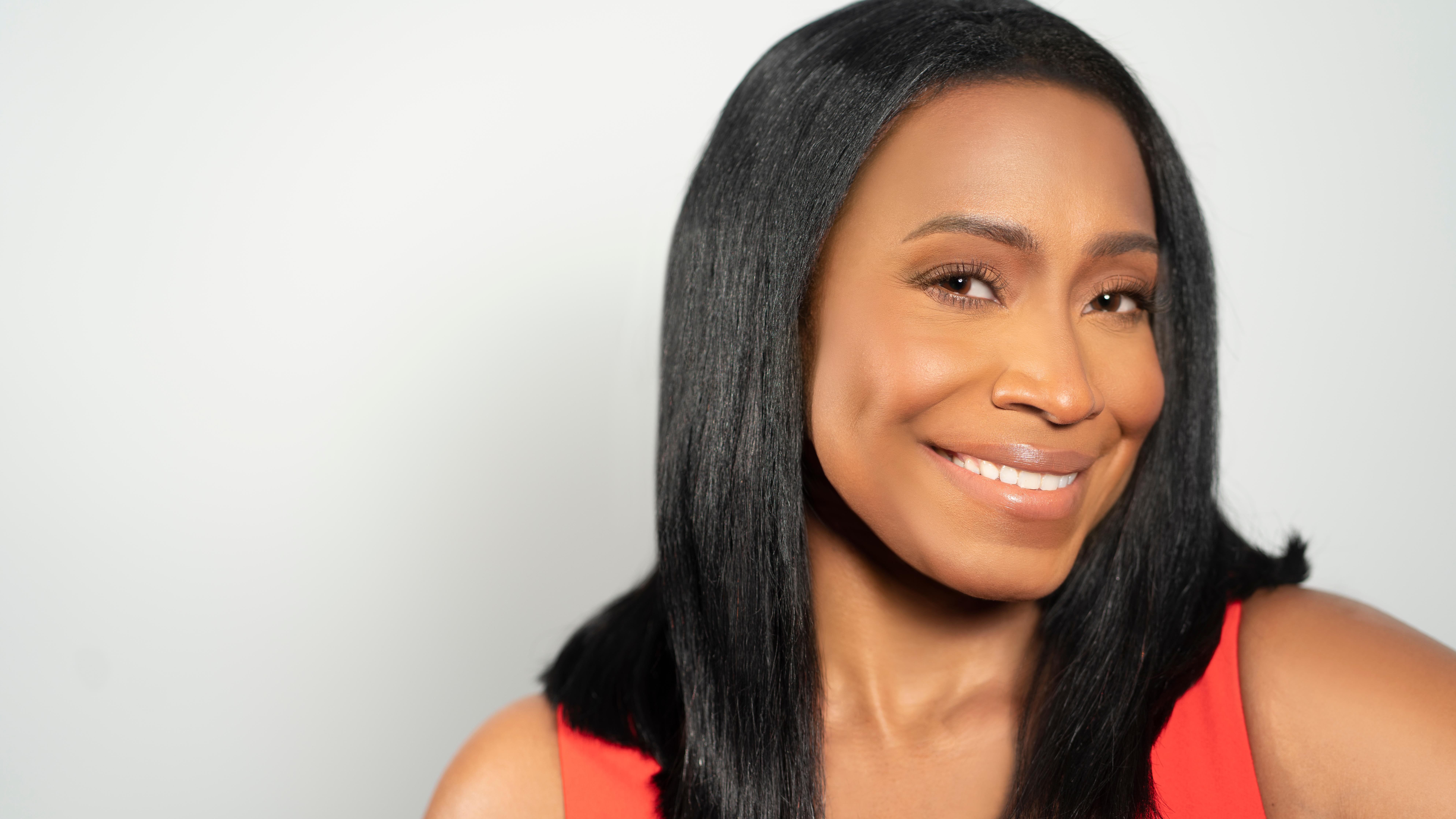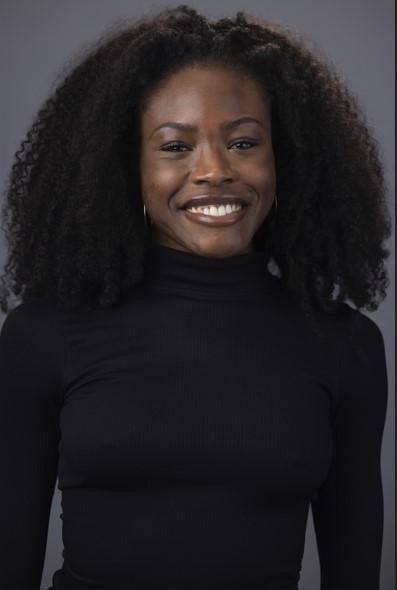Nickie Robinson is the creator and founder of GoodGirlPR, a public relations firm she launched in 2008. The idea stemmed from Nickie working as her own publicist for her DJ work under the name DJ Nickiee. She built her PR firm while working full-time in corporate and she sustained this work ethic until she was able to work PR full time. She’s funded events on her own, made connections across music, sports, education, and other industries, while also raising her young daughter.
Her business has grown from having a sole base in New York to having a presence in various cities including Los Angeles, Miami, D.C., and Atlanta. She’s also coined herself as the #fitpublicist, as she prioritizes fitness in her everyday life and shares her journey with her 36.5K Instagram followers. On top of her publicist work and her documenting her fitness journey, she still DJs and releases new mixtapes.
Nickie’s ability to connect with folks across various industries has made her a resource for connection and leverages this skill not only to create more business for herself, but to also help her clients and colleagues thrive in their own lives.
Her Agenda spoke with Nickie to learn more about how her interpersonal skills have helped and continue to help her business thrive.
Her Agenda: Along with being a publicist, you’re a DJ. Within my research, I read that the idea of GoodGirlPR came from you working as a publicist for your own DJ work while working in corporate. Can you talk more about this time period, getting GoodGirlPR started?
Nickie Robinson: I was working on Wall Street and I was extremely bored, and I always wanted to be a DJ so I became one. I realized, in order to speed up my career, I needed to have a publicist. Initially, I hired a PR firm but they didn’t do anything for me. I felt like they actually leveraged my network at events, instead of bringing their own network. So [I] came up [with] the idea that I should create this company called GoodGirlPR, that would act as my publicist. From that point on, a lot of celebrity DJs reached out to me and then I started doing event PR, and beauty PR back in 2008, through 2010.
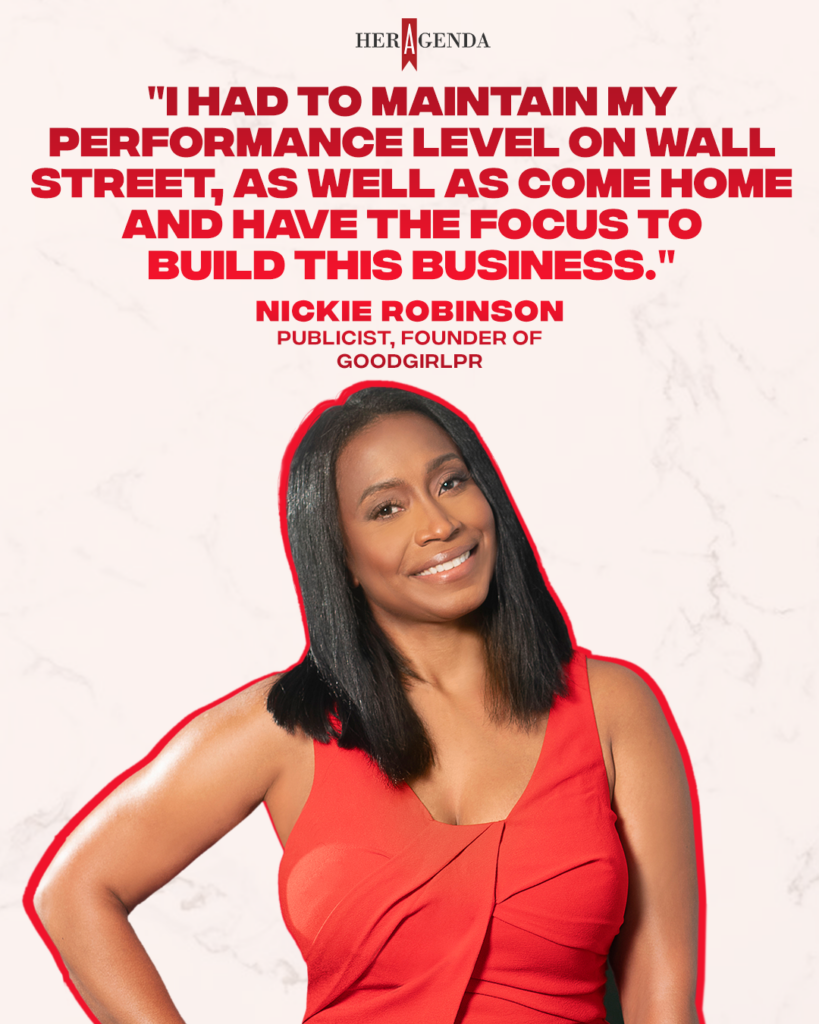
Her Agenda: Before switching to full-time founder, how did you balance managing the business of a creative endeavor, while also working in the corporate world?
Nickie Robinson: It was very hard. At that time, I was learning how to manage various projects [and] I would get quite overwhelmed because I was expected to perform on Wall Street. On Wall Street, I always had a full bonus, which is given to parties who do an excellent job. So I had to maintain my performance level on Wall Street, as well as come home and have the focus to build this business. So eventually, it became very overwhelming. So I switched from a full-time role on Wall Street to more of consulting work. I did more project-based work as a consultant, which ironically paid more than my full-time salary on Wall Street. Then I kind of used my earnings from consulting and invested it into building GoodGirlPR.
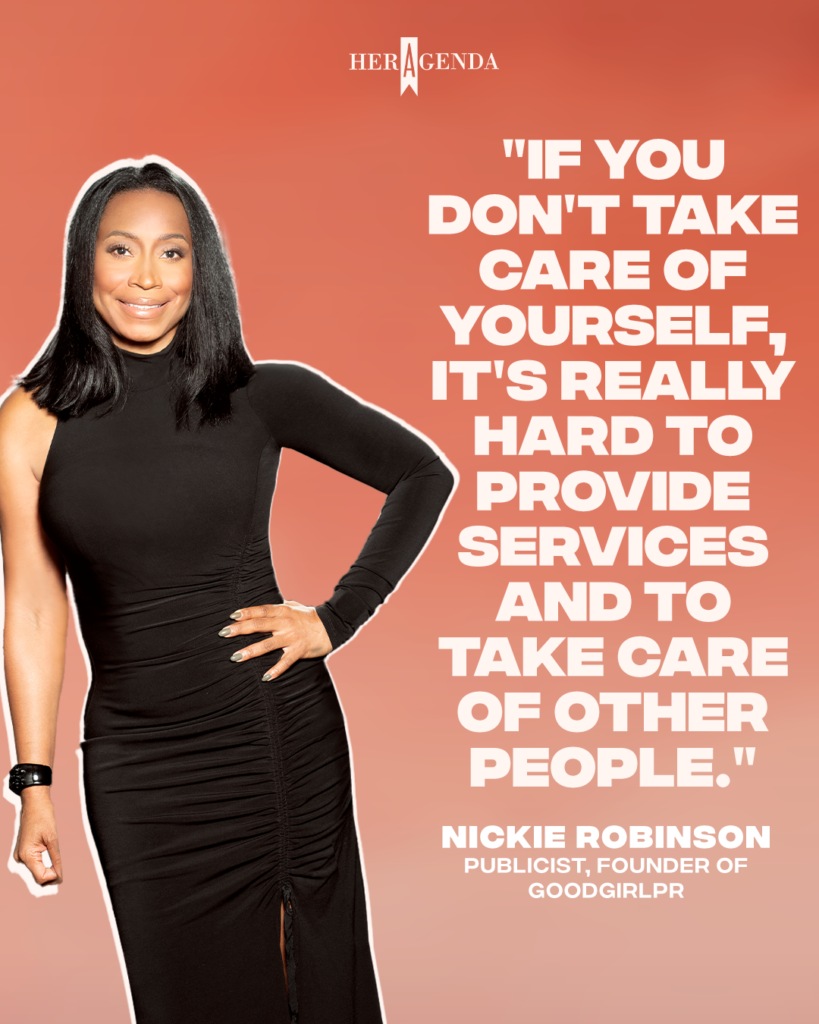
Her Agenda: Can you talk about how you were able to get through that and work through being overwhelmed, knowing that it was gonna be worth something at the end of the day?
Nickie Robinson: Well, because in the industry, a lot of times, you’re coordinating with multiple people. You’re also doing that on Wall Street, but on Wall Street, you’re coordinating with different departments. In the industry, you’re coordinating with different people, and as you know, people all have different personalities. So I think that becoming a publicist made me more emotionally intelligent, to be able to manage collaborating and working with different personalities within the industry. Fast forward to 2023, I’m able to identify personality types, and to collaborate efficiently knowing those details and how to manage their expectations or core positive traits, etc., so I can get things done.
Her Agenda: Those foundational relationships that you had to help you build out GoodGirlPR, how did you establish them?
Nickie Robinson: I’ve been doing events since college. So, I leveraged my email list from doing events in college, in law school, and post-law school to build my DJ career and then in turn, build GoodGirlPR. So these contacts have been since I was at NYU up until postgraduate. The more events you do, the more people RSVP to events, and then you add them to your mailing list so [my] list grew.
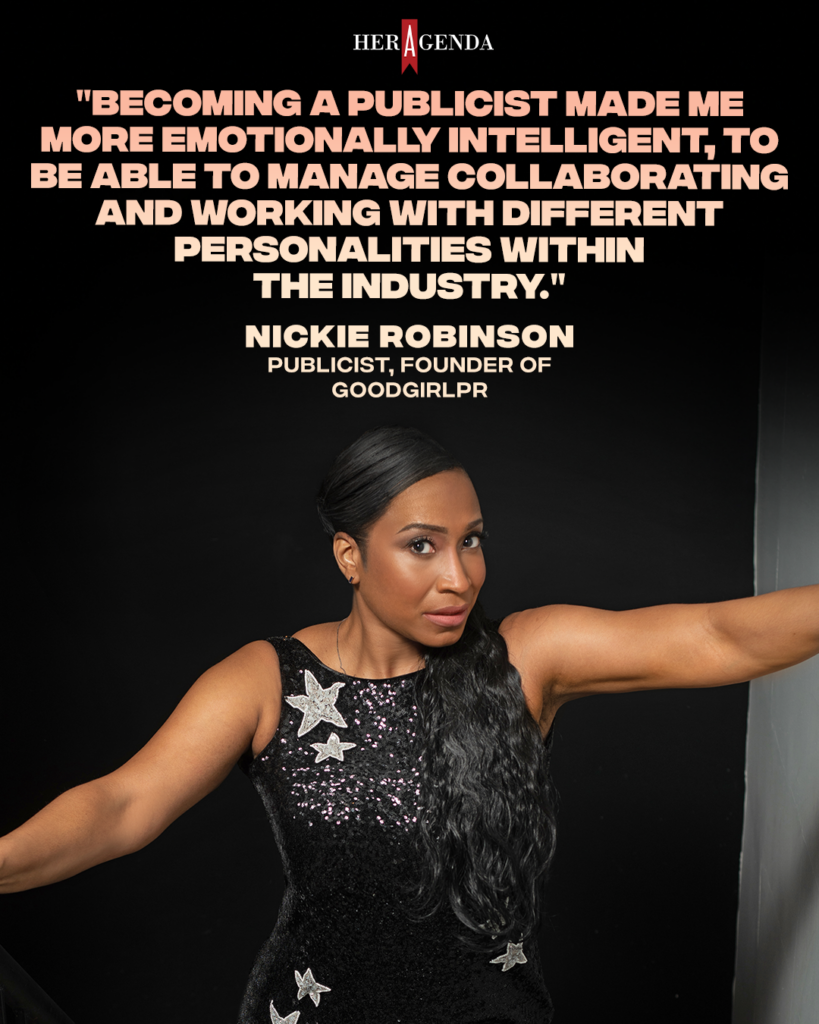
Her Agenda: One thing that’s really admirable about you is the diversity of your clientele. You serve folks from the music, political, and educational spaces, and honestly, many more on top of that. How are you able to connect with so many different types of people across industries?
Nickie Robinson: I realized the power of social media. I started my business around the time Twitter was new and I realized that Twitter would turn into a search engine, similar to legal databases, like Westlaw and LexisNexis. So, I began to update Twitter using terms and potential connectors so that people would eventually be able to find me. Back in the day, in order to advertise your business, people would do ads in newspapers, magazines, or even television commercials. But to me, as a new entrepreneur who was leveraging her Wall Street income into building a business, I had to find creative ways to advertise. I believed that Twitter was the best tool. I used hashtags like publicist or event planner so that people could find me.
Her Agenda: We touched on more of the technical aspects of being a publicist, but I’m sure also the publicist trust is important. When did you learn to trust yourself as a publicist?
Nickie Robinson: I learned to trust myself as a publicist when I realized there were successful people in the industry that did not have high school diplomas or even college diplomas. But, they had the ability to write well and get things done.
Her Agenda: How do you establish trust with your clients? How do you get them to trust you and also how do you know to trust them? I’m sure it’s a two-way street.
Nickie Robinson: Client trust is based on just energy and vibes. Over the years [I] have developed this level of emotional intelligence. So I understand that everyone’s different, but people fall into certain buckets as far as personalities in determining whether I want to bring those clients on or not, based on that information. And then client trust is having a contract that outlines expectations and parameters so that a client has certain type[s] of KPIs [Key Performance Indicators] that they can look at, and judge whether I’m doing a good job or not. Although PR is not guaranteed, and many publicists will say that, I try to manage expectations to minimize disagreements in business.
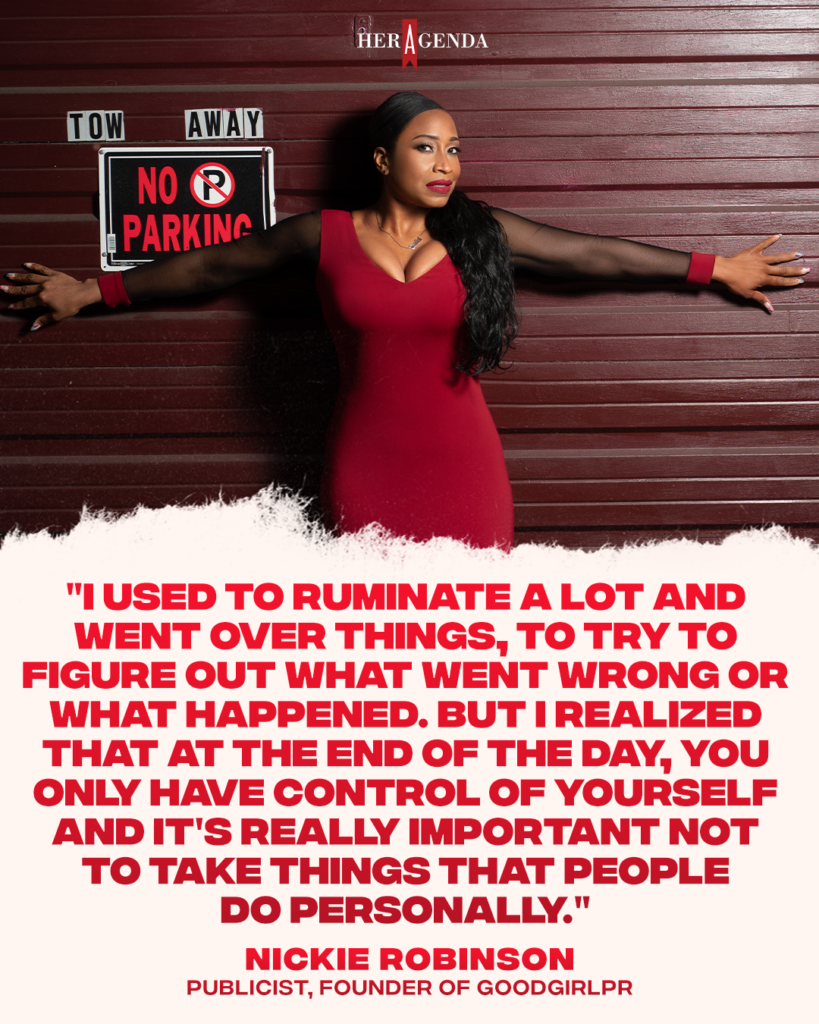
Her Agenda: When you have your own business, especially a media business like PR, how important are interpersonal skills to the job?
Nickie Robinson: They’re extremely important, everyone’s different and everyone has a different personality. When you have a contract and outline what you’re supposed to do, in my opinion, as long as you’re working within those parameters, you’re doing your job. But often, there [are] clients who expect more and it tends to be the clients that have the smallest budgets who want more bang for their buck. So a lot of times with publicists, although we want to help everyone, we kind of know that smaller budgets might be a little bit more demanding. You have to be able to manage those expectations and pick and choose who you give your energy or be drained.
Her Agenda: What would you say your strongest interpersonal skill is?
Nickie Robinson: Kindness [and] respect.
Her Agenda: You’re a very dimensional woman. You run your own firm, you’re a DJ and you coined yourself on social media as the “#fitpublicist” as you document your gym journey. And on top of all that, you’re a mom of a young daughter. I feel like you thrive off of having so much on your plate. How do you use your multifacetedness to your advantage?
Nickie Robinson: Launching this business taught me the ability to multitask on a very high level because I was working a full-time job while trying to build this company. Now that I don’t have a full-time job, I’m able to allocate time for self-care. I’ve realized over the year[s] that if you don’t take care of yourself, it’s really hard to provide services and to take care of other people. So, the #fitpublicist brand was purely to keep myself accountable by posting and checking in that I’m doing my workouts, keeping me on track, and hopefully inspiring others. It took me a long time to be able to balance operating at a high level from a business standpoint and taking care of myself, physically. I’ve always worked out all my life, but when you’re an entrepreneur, you become a little bit of a workaholic and you never have enough time for anything else besides work. Eventually, especially after childbirth, I realized that I had to get myself back together, and focus and work out and allocate time in the mornings for self-care.
And I think that because I’m in the best shape of my life, I’m able to show up for my clients and be super confident that I’m representing them, and I’m looking and being my best. But also, having the energy to have multiple clients and multiple things going on and not be overwhelmed.
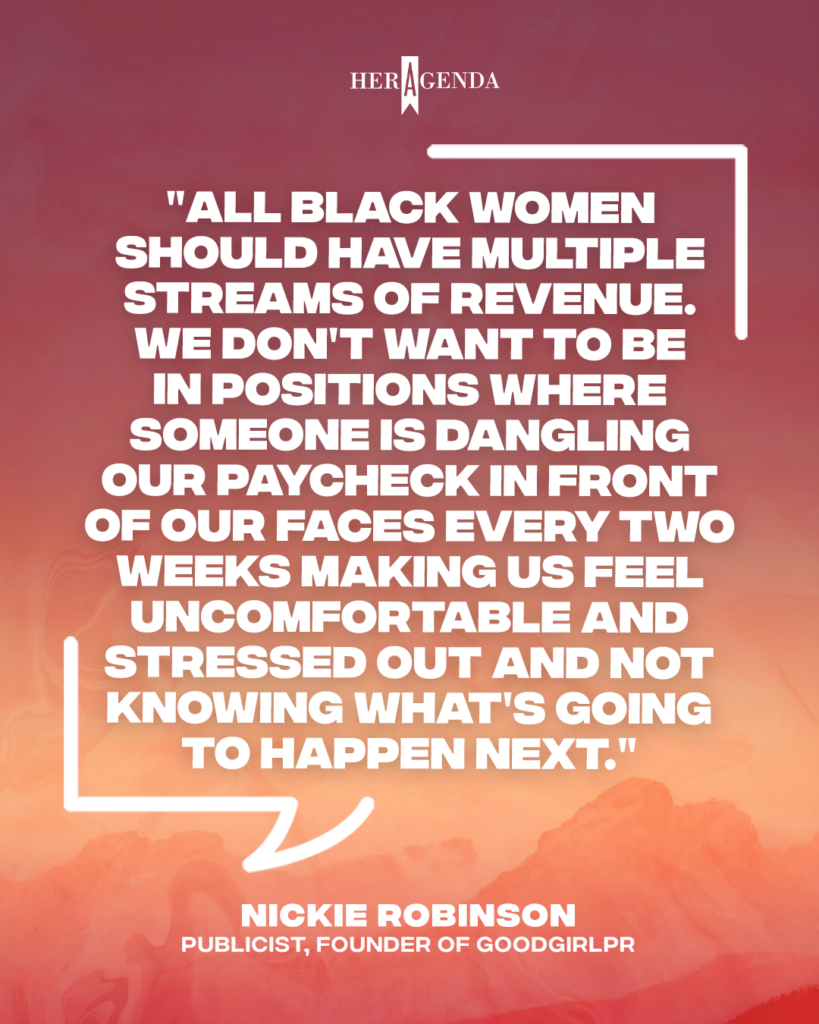
Her Agenda: What about your daughter? What do you hope she learns from you as she sees you, firsthand, take control of your life and be a boss in the way that you are?
Nickie Robinson: She definitely realizes the importance of eating right and exercise. It’s funny, when I took her to the pediatrician for her annual checkup the doctor said, ‘You take such good care of her.’ And I was kind of surprised by that comment because I thought all parents [took] such good care of their kids. I didn’t realize that kids can get high blood pressure. She doesn’t have high blood pressure, her BMI is within range, and she’s able to run a mile or run two miles because I used to make her run with me sometimes, or walk with me, even though we might have a car, just because she has [to] exercise her little legs. So, I think that working out has taught her the importance of self-care as she gets older, but also the power of consistency. No one can just be automatically great at something. It takes time, and you have to be consistent. So I think [I show] her on a day-to-day basis, how [I’m] very routine and on a schedule, she even keeps a list of things to do, which I love. She’s learning how to organize her day and her bag and her schedule and she definitely pays attention to what she eats and understands that exercise is always going to be a part of her life.
Her Agenda: What is your mantra or a quote or saying that you stand by?
Nickie Robinson: Lately, it’s been everything is what it is. I think that as I’ve gotten older, I realized the importance of just staying present and not thinking about the past and just really staying present.
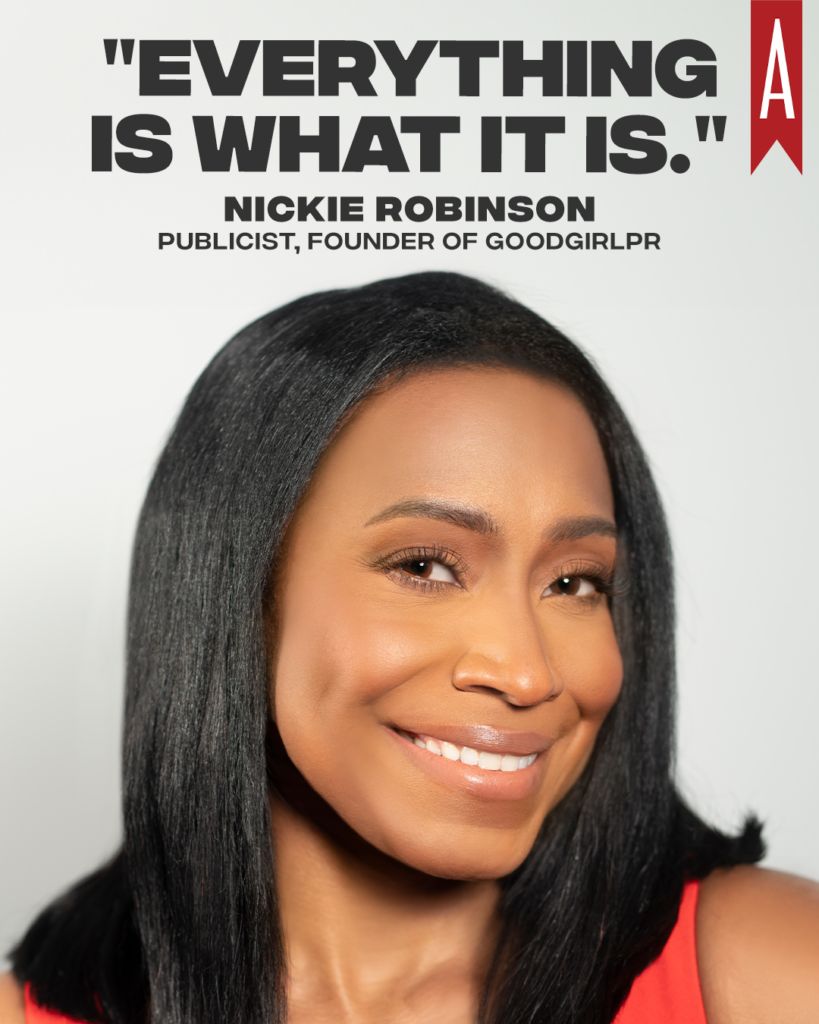
Her Agenda: Can you explain what inspires that?
Nickie Robinson: As I got older I realized that I [used to] ruminate a lot and went over things, to try to figure out what went wrong or what happened. But I realized that at the end of the day, you only have control of yourself and it’s really important not to take things that people do personally.
Her Agenda: Did you think you would see your firm grow to the heights it has grown?
Nickie Robinson: No. And in fact, another large publication reached out to me for an interview and the premise of the article is going to be about the fact that when I worked on Wall Street, you have to disclose outside business activities. I was working at BNP Paribas and I had two businesses, one I deactivated so I didn’t have to disclose it and the other I kept GoodGirlPR because my name is all over it. They made me change a couple of things on the website, which is pretty funny. They [also] evaluated my business behind my back, my boss did. He called me in and he slid across the desk the evaluation of my business from a financial perspective, which I thought was kind of evasive and not right. I’m disclosing the business, but that doesn’t give you the right to evaluate the value of it. He told me the value, I was surprised and I kept the number to myself. And from that point on, I just started grinding really, really hard. I had no idea that an idea that stemmed from me DJing, and something that I had just been consistently doing since 2008, up until 2015, could be worth that amount of money. I just kept the number to myself, kept it very humble, and just continue[d] to work harder and that gave the battery in my back, so to speak. It’s one thing to have a business, but it’s another thing to know how much something is worth and then you want to double it and triple it, right? In my view, it was worth that much and I was doing it part-time. So I was like, ‘Wow, what if I do this full-time?’ And so in 2017, I started just doing PR full time, without working on Wall Street.
Her Agenda: What advice would you give to women who may feel scared or timid to put themselves out there and start something new in similar ways that you’ve had to do?
Nickie Robinson: While I was in law school, I wrote a paper about intersectionality. And it talks about how Black women are at the intersection of race and gender. A lot of times, Black men feel like we have it easier, but I think in fact, we have it worse. Because we’re Black and we’re also [women]. As a result, white men react to us in a certain way, Black men react to us in a certain way, and then White women react to us in a certain way. It’s really hard to climb the corporate ladder at times and there’s often a glass ceiling and because of that, I think that all Black women should have multiple streams of revenue. We don’t want to be in positions where someone is dangling our paycheck in front of our faces every two weeks making us feel uncomfortable and stressed out and not knowing what’s [going to] happen next, because we’re expected to perform at this highest level where we can’t make any mistakes. So I think that, because I had this outside business, it gave me this sense of confidence when I worked on Wall Street, because it was like, okay, I’m here, I’m doing my thing. I don’t miss a deadline, I’m always on top of everything, but I don’t need to be here. So they didn’t have that control. I think that it’s important not to allow people to have that type of control over your livelihood.
A lot of these lessons, I had to learn the hard way. I was taught to go to college and become a doctor or a lawyer, and entrepreneurship was never talked about in my household, even though my family would have full-time jobs that they’ve kept for decades, but they would always have the little side hustles. But, they didn’t have brick and mortars or brands. I think that entrepreneurship is really important. In today’s society, you have inflation, certain countries are in a recession, and people are getting laid off. It’s really important to have multiple streams of revenue to safeguard your livelihood.
[Editor’s note: This interview has been edited for length and clarity.]

